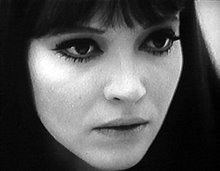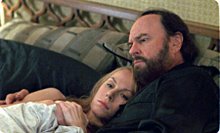We've been starting to talk about music and soundtrack issues in film narratives (one of the elements which distinguishes them from written narratives). Because Tarnation makes such an extensive use of music, I thought I'd list all the songs here so you can think about them ahead of time. Unfortunately, Blogger, unlike Vox, doesn't let me embed mp3's or I'd set it up so you could actually hear them. There may be links I can put in later---I'll investigate over the weekend what the possibilities are, but for now here's a list of the songs and music used in the film.
(While Tarnation cost only slightly over $200 to make, being able to release it commercially brought a lot of extra expense. Caouette showed his first cut at Sundance and other "indie" film festivals where he attracted the patronage of Gus Van Sant and Jonathan Cameron Mitchell who helped him raise the money necessary to transfer his work to film and obtain music rights for the songs used, which, you won't be surprised to hear was the biggest expense of all. Even with around $400,000 spent obtaining song permissions and another couple thousand for film transfer, Tarnation still came in well under the catering budget of most Hollywood films.)
Low - "Laserbeam"
Iron and Wine - "Naked As We Came"
Glen Campbell - "Wichita Lineman"
Lisa Germano - "Reptile"
Cocteau Twins - "Ice Pulse"
from the musical Hair - "Frank Mills"
from the musical Hair - "Walking In Space"
Marianne Faithful - "The Ballad of Lucy Jordan"
HEX - "Diviner"
Low - "Embrace"
Angelo Badalamenti (Blue Velvet soundtrack) - "Mysteries of Love"
The Chocolate Watchband - "It's All Over Now, Baby Blue"
The Magnetic Fields - "Strange Powers"
Jean Wells - "After Loving You"
Dolly Parton - "A lil' Ole Pissant Country Place"
The Red House Painters - "Around and Around"
Low - "Back Home Again"
Mavis Staples - "How Many Times"
The Red House Painters - "Around and Around"
Hopewell - "Safe as Milk" (used in the film's trailer)
An original score and other incidental music was compsed by Max Avery Lichtenstein and John Califra.
Thursday, March 8, 2007
Subscribe to:
Post Comments (Atom)
































2 comments:
Ugh, nothing kills me more than the crazy fees that some music companies charge to use their music. It's kept more than one film of mine from being able to be screened because I used music and then when I inquired about the fee to have the right to use it, nearly had a heart-attack. When your budgets are at most $400 dollars, it's pretty impossible to suddenly have several thousand dollars for music. What makes it worse is that the companies KNOW I can't afford the fees, and tell me that if I say, pay only $8000 dollars for the first 5, then the other 2 will be $1 a piece. Oh well, that's why it helps to either find obscure bands or score your own films.
And you're right to note that it is MUSIC COMPANIES who charge these fees...the bands are
not the one seeing the $$$ here.
Copyright struggle is the political fight of the 21st century. Intellectual property law is the ground on which the most important battles are being won and lost---and not just for music, texts, and other cultural "products." Access to affordable medicine, among other things, is also at stake.
On the other hand, some musicians and bands are working to make their material as accessible as possible, with CC licenses, no DRM-crippled mp3's and so on...
Post a Comment